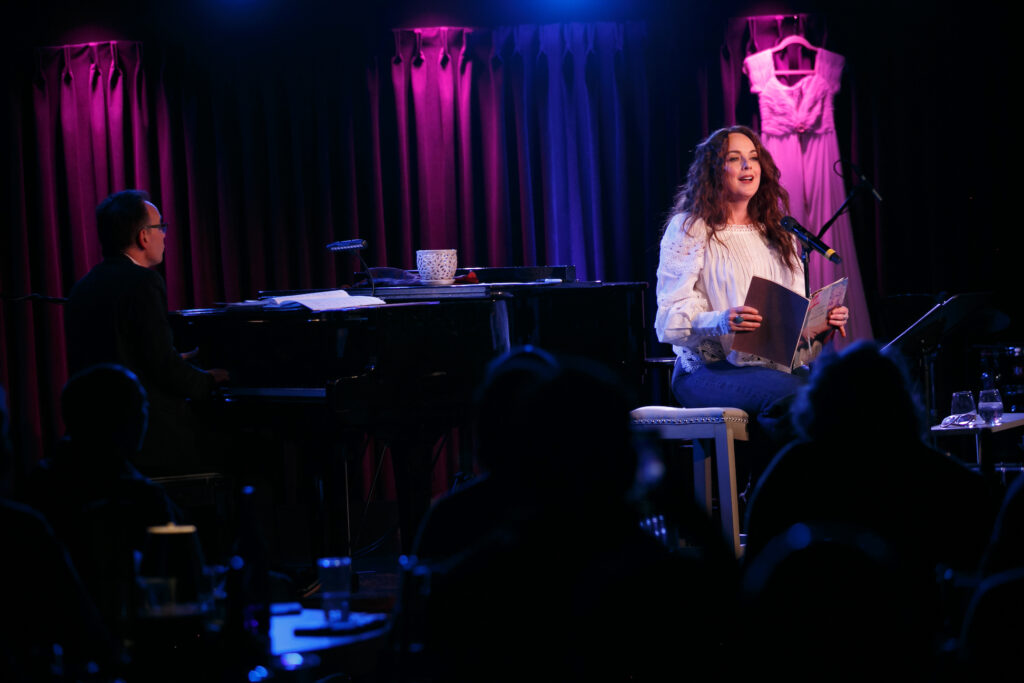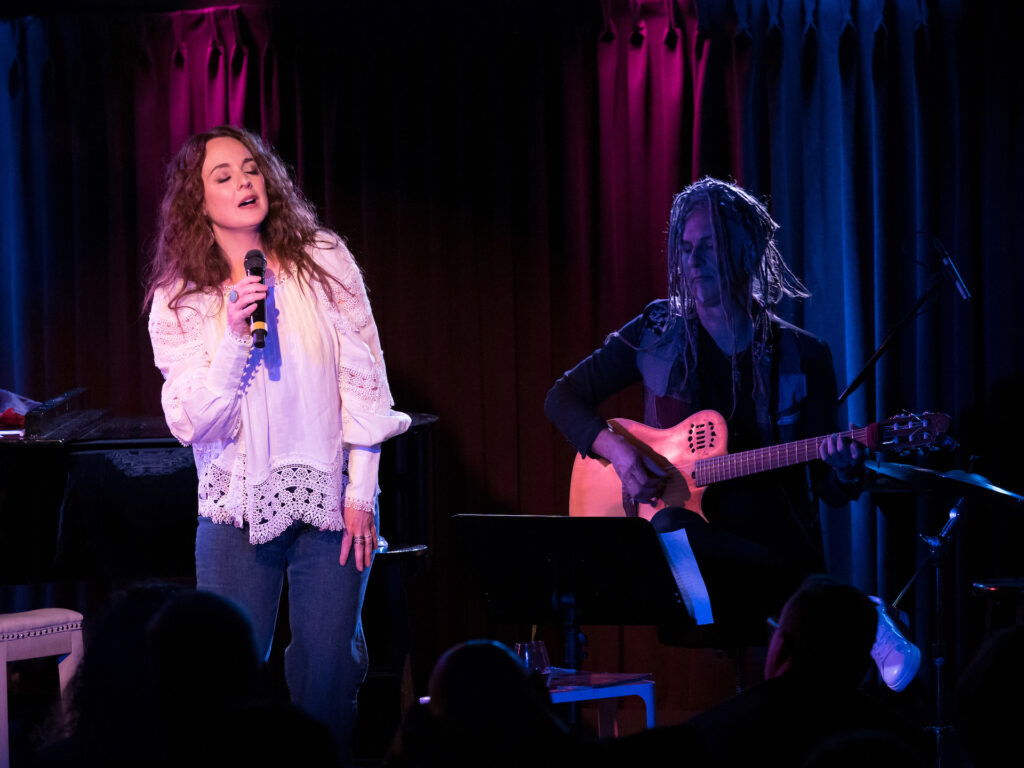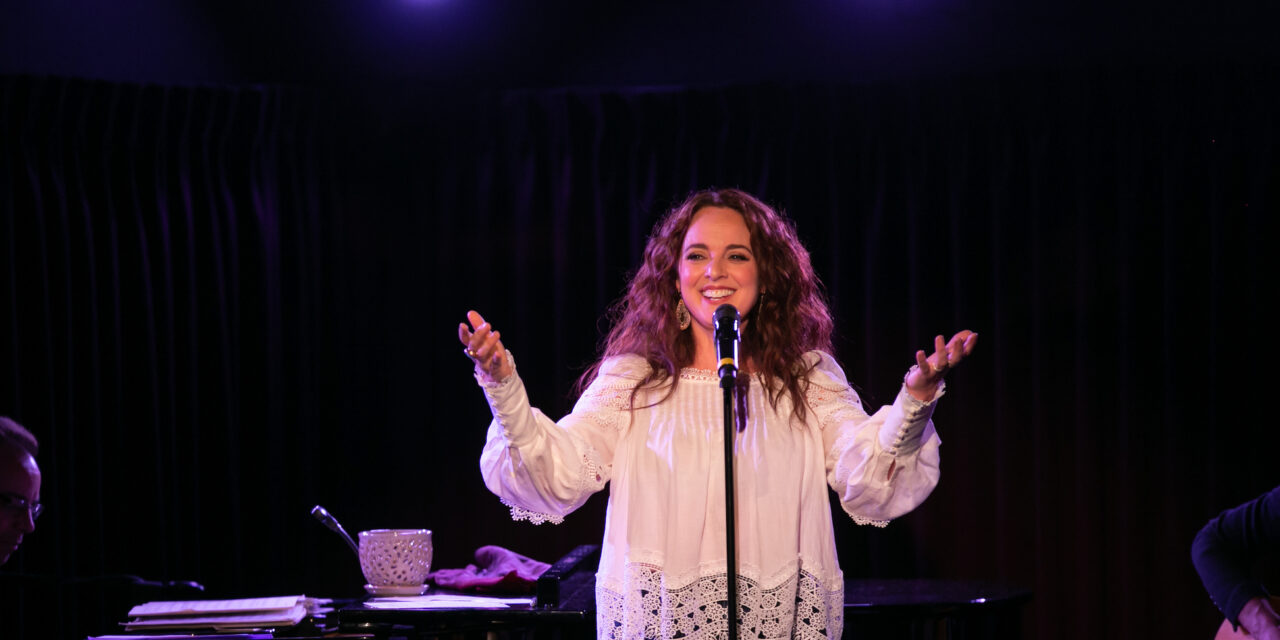By Marilyn Lester . . .
In the world of entertainment, there is a genre called cabaret of the spoken word, much like a poetry reading. Melissa Errico has been creating her own brand of spoken word cabarets for years, which is why anyone familiar with her shows knows they come with song and a substantial amount of narrative. In Terminal Ingénue at The Green Room 42, the singer-actress (and author/writer) has taken the form to very new heights, creating a memoir with song cabaret. Reading from her manuscript, Errico sang her way through her own history, with a focal point of her career as a terminal (read perpetual) ingénue. Fair dues to her for that: she’s had the good fortune of superb genes, plenty of talent and a youthful attitude to carry her through these roles well into her 40s. It would be hard to believe the diva just turned 53, and that is the point.

Decked out informally in jeans and a white cotton blouse, the show was aimed at intimacy. With candor and humor, Errico dropped a certain amount of stage glamor for the personal approach of sharing her story with characteristic intelligence and supreme self-confidence, plus wit and humor (speaking of her appearing au natural on stage, she dubbed it “ingénudity). To these well-established abilities and a flawless flute-like soprano, add a passion for language and telling stories, which has led to her becoming a contributing writer for The New York Times. Can we expect any less of a highly-motivated woman who graduated from Yale University with a degree in art history and philosophy?
It was Errico the vocalist that stepped forward first, opening Terminal Ingénue with a medley of “How Are Things in Glocca Morra? / Wouldn’t It Be Loverly / My Favorite Things” (Burton Lane, Yip Harburg/ Lerner & Loewe/ Rodgers & Hammerstein). Scholar Errico then appeared to define the meaning of “ingénue” and further explain how she became a terminal ingénue. Skipping ahead, she declared she’d now arrived at the point of coming to terms with “ingénuity,” happy to be, with gratitude, a girl singer in charge of her own destiny. As a finale to the show, could there be any other number than “Move On” (Sunday in the Park with George), sung with verve and deep meaning?


Back to the top of the show, Errico’s memoir began with an infatuation, a dream and a child’s unquenchable desire to perform—to be on a stage and to do whatever it took to get there. Summer camps were theater camps, where she hung out with Jason Robert Brown, by the way. At age 12 she began a professional career, appearing on the syndicated children’s TV series “The Great Space Coaster.” Later, she took a break from Yale studies to perform in a tour of Les Misérables (“I Saw Him Once,” Alain Boublil, Claude-Michel Schönberg). The importance of her mother’s support led to a 2017 tune, “My Mother Sang Through Me” (Peter Mills, Adam Gopnik), with mom kvelling in the audience. Post Yale, Broadway called: Anna Karenina (1992), My Fair Lady (1994) and High Society (1998) in quick succession. Errico presented “Shy,” cut from Lerner & Loew’s My Fair Lady, to bereplaced with “I Could Have Danced All Night”—a very wise move.
There were workshops, a stint in LA and marriage to tennis ace Patrick McEnroe (motherhood followed with a girl and twin girls). Then, in 2002 a return to Broadway in Amour (Michel Legrand, Jeremy Sams) became a circumstance that, as she reported, changed her life. The show was painfully short-lived but her fast friendship with Legrand lasted until his passing in 2019, and from this show she sang “Other People’s Stories.” Her last Broadway outing was 2010’s White Christmas, but there was always plenty of projects and work to keep her busy, including two ingénue leads in her 40s for the Irish Rep: Finian’s Rainbow, which provided the encore of “How Are Things in Glocca Mora” and On a Clear Day You Can See Forever (“Hurry It’s Lovely Up Here,” Burton Lane, Alan Jay Lerner).


For a decade or more, Errico has been working with A-list music director, Tedd Firth. He’s essentially a creative, wildly talented jazz player and arranger—his happy place. What’s miraculous about his piano style, though, is that it supports vocalists of all stripes. Errico’s presentation is largely and fixedly Broadway, yet the combination works beautifully. In an epilogue of moving on, Errico brought to the stage JC Maillard, Caribbean/World guitarist and percussionist Thierry Arpino. Both artists enhanced a turn in a new direction for Errico, the non-Broadway tunes “Night Ride Home” (Joni Mitchell) and “The Bad and the Beautiful” (David Raskin, Dory Previn), which sounded like an extended, sung haiku. Returning to familiar territory for her penultimate number, Errico offered music polymath Rob Mathes’ arrangement of My Fair Lady’s “I’ve Grown Accustomed to His Face.”
Errico managed to cover a lot of ground in her nearly 90-minute presentation, but you get the gist here, and if and when her memoir is published a fascinating read is in the cards.
Photos: www.dkshots.com – david@dkshots.com


















